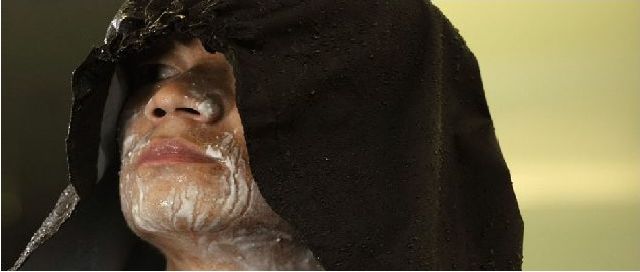Fairy Tale Killer (2012) 
“Fairy Tales turn ugly, twisted and bloody.”

Director: Danny Pang
Cast: Ching Wan Lau, Baoqiang Wang, Elanne Kwong
Synopsis: A fearless cop is appointed to investigate a series of puzzling murders which resemble Fairy Tales.
Hong Kong-born director Danny Pang’s reputation has always been a lot greater than he deserves, I think. The only two movies he has made of any real quality were The Eye (2002) and the original 2000 version of Bangkok Dangerous, both of which were made early in his career with his brother Oxide. This one, Danny wrote with the late Kam-Yuen Szeto, and while it’s central idea is a good one, its execution is confusing and Pang’s stylish affectations overshadow what is a very ordinary treatment. Of course, this being a Hong Kong movie, Fairy Tale Killer is also fatally hampered by the usual lousy subtitles. Sometimes they read as if written by the Google Translate program.
Ching Wan Lau plays Han, a disillusioned middle-aged cop who awaits the results of his promotion exams with nine-parts weary resignation to one-part hope. He’s the head of a tightly-knit unit — and I mean really tightly-knit, at one point all five of them go on a stakeout together — who are faced one day with a strange individual with a painted face who claims to have committed a murder. The man, who is clearly a little out of the ordinary, shall we say, is Jun (Wang Bioqiang), but his alleged victim is very much alive. Deciding that Jun is a timewaster, Han releases him only for the victim to turn up dead shortly afterwards. Exactly why Jun decided to turn up out of the blue and confess to a yet-to-be-committed murder is never explained, and is presumably simply a clumsy way of avoiding having to go through all that dull detective work. Han and his crew obviously have a pretty good idea of who the killer is. Fortunately, Jun’s confession was never written in a report, so no blame can be attached to him or his crew for letting the killer slip through their fingers.
This victim proves to be just the first, and Han quickly starts feeling the heat to catch Jun fast. In addition to this pressure at work his home life is also under stress. He has a young autistic son whom he’s unable to connect with and a wife who’s getting fed up with his air of detachment and his long hours at the office, which she correctly presumes are due to his reluctance to be with them. Family and business then merge when Jun’s next victim, who was burned to a crisp in a furnace, makes an unscheduled appearance at a kiddie’s show he’s dragged along to by his wife. Coincidence? I think not. Jun has a sister (Elanne Kwong) who is equally as strange as her brother, only her idiot savant eccentricities manifest themselves in the obsessive drawing of elaborate but childlike scenes. These pictures often contain the image of a devil, which Jun rightly assumes to be a depiction of him. Naturally, Jun’s more than a little upset by this — after all, he’s been carrying out all these murders to be her prince in shining armour.
Fairy Tale Killer really is a lot less interesting than it ought to be, largely because most of the characters are under-written. Han comes across as an underhanded, selfish man who neither knows nor cares about the needs of his stressed out wife and autistic son, while hardly any other character is given enough screen time or attention to create much of any kind of impression. The one exception is Jun, who is by far the most interesting character in the movie, but again Pang and Szeto shy away from delving too deep into the reasons for him becoming the way he is or expanding on his relationship with his sister. These two seem barely capable of surviving without supervision, despite their unique skills, and yet they appear to live in some kind of bubble into which the world is unable to enter but from which they can freely emerge. But then, Han’s puzzling about turn in the movie’s final scenes would merely have contradicted any fine detail the writer’s might have given to him, which means they had no choice but to keep his characterisation broad. There’s potential here, and it’s sad to see a filmmaker like Pang allowing it to go to waste…
httpv://www.youtube.com/watch?v=48dwF4bvS98
